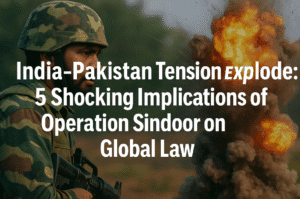India-Pakistan Tensions Explode: 5 Shocking Implications of Operation Sindoor on Global Law
Following India’s Operation Sindoor—targeting nine alleged terror camps in Pakistan and PoK in retaliation for a deadly attack in Pahalgam—Pakistan condemned the strikes as a violation of the UN Charter’s Article 51, which permits self-defense against armed attacks but mandates immediate UN Security Council reporting and proportional action. India defended its operation as “measured” and focused on dismantling terror infrastructure, avoiding military sites.
The dispute revives debates over whether unilateral strikes against non-state actors in sovereign territory align with international law, particularly when host nations are accused of inaction against militants. Historically, such clashes (e.g., India’s 2019 Balakot strike) underscore the precarious balance between sovereignty and counterterrorism. With Pakistan vowing a response and both nations possessing nuclear arms, global powers urge restraint, wary of escalation.
The incident highlights gaps in addressing state accountability for cross-border terrorism, testing the UN’s ability to reconcile self-defense rights with territorial integrity in an era of asymmetric threats.

India-Pakistan Tensions Explode: 5 Shocking Implications of Operation Sindoor on Global Law
In the wake of India’s targeted military action, codenamed Operation Sindoor, tensions between India and Pakistan have escalated, reviving long-standing debates over international law, self-defense, and cross-border terrorism. Pakistan’s Deputy Prime Minister and Foreign Minister, Ishaq Dar, swiftly condemned the strikes, accusing India of violating Article 51 of the United Nations Charter. This incident marks another flashpoint in the fraught relationship between the two nuclear-armed neighbors, with implications for regional stability and global legal norms.
The Trigger: Operation Sindoor
On May 7, 2025, Indian forces conducted precision strikes on nine suspected terror camps in Pakistan and Pakistan-occupied Kashmir (PoK). The operation, described by India’s Defense Ministry as “focused, measured, and non-escalatory,” followed a deadly terrorist attack in Pahalgam, Jammu and Kashmir, which claimed 26 lives. India asserted that the targeted sites were hubs for planning and directing attacks against its territory, emphasizing that no Pakistani military facilities were struck.
Pakistan, however, denounced the action as a violation of sovereignty and international law. Dar’s invocation of Article 51 underscores Islamabad’s stance that India’s preemptive strikes exceeded the bounds of legitimate self-defense.
Decoding Article 51: Self-Defense or Overreach?
Article 51 of the UN Charter enshrines the inherent right of states to individual or collective self-defense in the event of an armed attack, pending Security Council intervention. Crucially, it requires that any defensive measures be immediately reported to the Council and remain proportional to the threat.
Key nuances of Article 51:
- Armed Attack Threshold: The provision applies explicitly to responses against armed attacks, leaving ambiguity around preemptive strikes or actions targeting non-state actors (e.g., terrorist groups) operating from another nation’s soil.
- Proportionality and Necessity: Legal precedents, such as the 19th-century Caroline Case, dictate that self-defense must be immediate, necessary, and proportionate.
- State Responsibility: If a host nation (in this case, Pakistan) is deemed unable or unwilling to curb threats from its territory, the attacker (India) may argue justification under Article 51.
Historical Context: A Recurring Flashpoint
This is not the first time Article 51 has been invoked in Indo-Pakistan conflicts. In 2019, India’s Balakot airstrike, following the Pulwama suicide bombing, similarly cited self-defense against terrorism. Pakistan, in turn, has historically denied state complicity in militant activities, though groups like Lashkar-e-Taiba and Jaish-e-Mohammed—linked to attacks in India—reportedly operate from its soil.
The international community, including the Financial Action Task Force (FATF), has repeatedly pressured Pakistan to dismantle terror infrastructure, placing it on its “grey list” for inadequate counterterrorism measures.
Legal and Diplomatic Tightropes
India’s strike raises complex questions:
- Non-State Actors and Self-Defense: Can a nation invoke Article 51 against terrorists in another state without its consent? The UN’s stance remains divided. While the 9/11 attacks led to broad acceptance of U.S. actions in Afghanistan under Article 51, unilateral strikes absent clear state collaboration (e.g., Pakistan’s alleged role) remain contentious.
- Sovereignty vs. Security: Pakistan’s outcry highlights the tension between territorial integrity and a state’s duty to prevent cross-border threats. Experts argue that if Islamabad fails to act against militants, it risks legitimizing external interventions.
- Risk of Escalation: Both nations possess nuclear arsenals, amplifying global concerns. India’s emphasis on “non-escalatory” tactics aims to signal restraint, but Pakistan’s vow to “respond appropriately” keeps tensions simmering.
International Reactions and Next Steps
Global responses have been cautious. The U.S., Russia, and China—key Security Council members—are likely to urge dialogue while scrutinizing India’s compliance with international law. The UN may press for evidence linking the targeted sites to imminent threats, a factor critical in assessing the strikes’ legitimacy.
Conclusion: A Test for Global Order
Operation Sindoor underscores the fragility of international norms in an era of asymmetric warfare and transnational terrorism. While India seeks to frame its actions as a necessary defense against terrorism, Pakistan’s Article 51 counterclaim spotlights the ambiguities in governing cross-border interventions.
The incident serves as a reminder that without robust multilateral mechanisms to address state-sponsored terrorism, nations may increasingly resort to unilateral measures—raising the stakes for global peace and legal coherence. As both sides navigate diplomatic fallout, the world watches closely, aware that the precedents set here could reshape the boundaries of self-defense in the 21st century.
You must be logged in to post a comment.